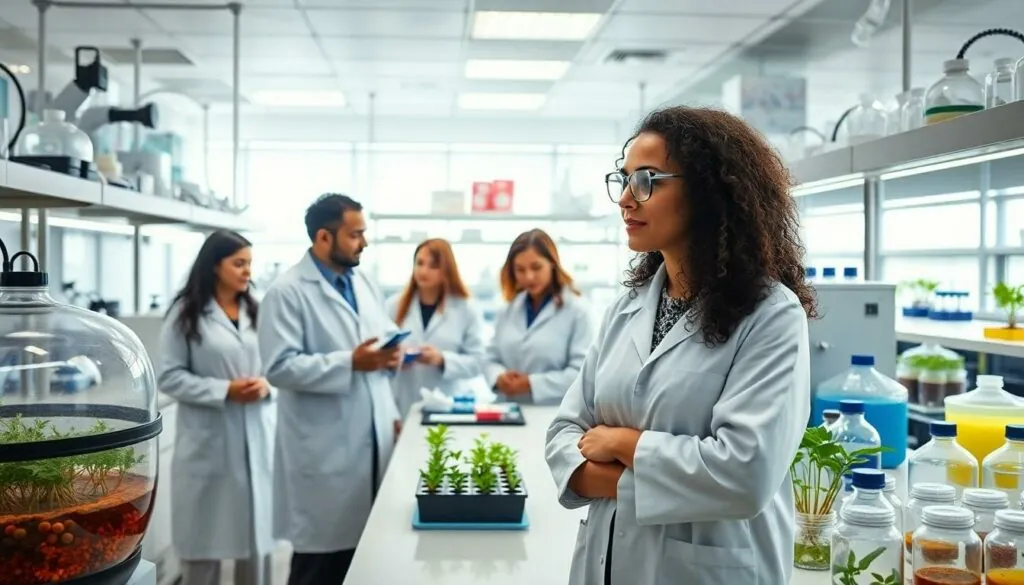Table of Contents
ToggleIn a world where plant-based diets and lab-grown meats are the talk of the town, biotech protein is stepping into the spotlight like a rock star at a sold-out concert. This innovative marvel isn’t just about feeding the masses; it’s about revolutionizing the way we think about food, sustainability, and health. Imagine proteins crafted in labs that can outsmart traditional sources in taste and nutrition while being kinder to our planet.
Overview of Biotech Protein
Biotech protein represents a significant advancement in food technology, focusing on sustainable and efficient protein production methods. This sector influences dietary trends, shifting from traditional animal sources to innovative alternatives.
Definition and Importance
Biotech protein refers to proteins produced through biotechnology, often derived from plants or cultivated cells. It plays a crucial role in addressing global protein demand while promoting environmental sustainability. Presenting as a viable alternative, it reduces reliance on livestock farming, which significantly impacts greenhouse gas emissions. These proteins mimic the taste and texture of animal-derived options, appealing to both consumers and industries. Enhancing nutritional profiles addresses health concerns associated with processed foods. Increasing interest in biotech protein aligns with the growing trend of plant-based diets and ethical eating habits.
Historical Context
The journey of biotech protein began in the 20th century with the advent of genetic engineering. Initial breakthroughs involved microbial proteins, paving the way for developments in lab-grown meats. By the early 2000s, researchers focused on optimizing plant proteins, recognizing their potential in food innovation. Accelerated advancements occurred alongside societal shifts toward sustainability and health consciousness. Notably, companies now invest heavily in biotech protein research to meet emerging demands. By 2020, the market witnessed a surge in lab-grown meat and plant-based protein production, indicating a strong consumer shift. These milestones mark significant progress in the pursuit of sustainable protein solutions.
Types of Biotech Proteins

Biotech proteins encompass various categories, each playing a unique role in health, industry, and agriculture. Understanding these types provides insight into their applications and benefits.
Therapeutic Proteins
Therapeutic proteins, produced through biotechnological methods, serve critical medical purposes. Examples include insulin for diabetes management and monoclonal antibodies used in cancer treatments. The production of these proteins often utilizes recombinant DNA technology, which enhances efficiency and reduces manufacturing costs. Significant advancements in this field have led to improved patient outcomes and expanded treatment options. Many biopharmaceutical companies focus on developing innovative therapeutic proteins to address unmet medical needs, bolstering the healthcare sector.
Industrial Enzymes
Industrial enzymes represent another crucial category of biotech proteins, used widely in manufacturing processes. These enzymes catalyze chemical reactions, increasing efficiency in industries such as food, textiles, and biofuels. For instance, proteases break down proteins in detergents, enhancing cleaning power. The use of these enzymes reduces energy consumption and waste, thereby promoting sustainability. Biotech advancements enable the production of specific enzymes that cater to diverse industrial requirements, optimizing resource utilization and productivity.
Agricultural Proteins
Agricultural proteins encompass proteins derived from plants and microorganisms, contributing to sustainable farming practices. These proteins play a vital role in enhancing crop resilience and productivity. For example, genetically engineered crops may produce proteins that confer resistance to pests and diseases. Incorporating biotech proteins into agriculture promotes soil health and reduces reliance on chemical fertilizers and pesticides. The potential of agricultural proteins extends to developing more nutritious food sources, supporting global food security and environmental sustainability.
Production Processes
Biotech protein production employs various innovative techniques, enabling sustainable protein sources and efficient manufacturing.
Recombinant DNA Technology
Recombinant DNA technology forms the backbone of many biotech protein production methods. This process involves combining DNA from different organisms to create proteins with desirable traits. For instance, insulin production benefits immensely from this technology, enhancing treatment for diabetes. Cells take up the engineered DNA, allowing them to produce human proteins, which are more effective than those derived from animal sources. Yield improvements using recombinant DNA have led to significant advancements in therapeutic protein availability.
Fermentation Techniques
Fermentation techniques play a crucial role in producing plant-based and microbial biotech proteins. In this process, microorganisms like yeasts and bacteria convert sugars into proteins, mimicking flavors and textures found in traditional meat products. For example, mycoprotein, derived from the fermentation of fungi, offers a nutrient-rich protein alternative. Fermentation allows scalability, enabling manufacturers to meet rising protein demands. Efficiency improves substantially through optimized fermentation conditions, reducing resource use while maintaining high-quality output.
Applications of Biotech Proteins
Biotech proteins find wide-ranging applications across various sectors, significantly improving health outcomes and environmental sustainability.
Medical Applications
Biotech proteins are vital in medicine. Insulin production relies on recombinant DNA technology, enhancing diabetes management for millions. Monoclonal antibodies treat numerous conditions, including cancers and autoimmune diseases. These therapeutic proteins improve patient outcomes through targeted therapies, decreasing side effects typically associated with conventional treatments. Advances in biotech enable the development of personalized medicine solutions, tailoring protein treatments to individual patient needs. They also contribute to vaccine production, providing rapid responses to emerging health threats.
Environmental Benefits
Biotech proteins contribute significantly to reducing environmental impact. They lower the reliance on traditional livestock farming, which contributes to greenhouse gas emissions. By utilizing plant-based sources, biotech protein production requires fewer resources, such as land and water, ensuring more sustainable food systems. Cultivated proteins also minimize agricultural runoff pollution by reducing the need for chemical inputs. Through innovative fermentation techniques, biotech proteins enhance food production efficiency while lowering carbon footprints. Overall, these advancements promote sustainable practices, addressing climate change while meeting global protein demands.
Challenges in Biotech Protein Development
Biotech protein development faces several significant challenges that affect its growth and acceptance in the market.
Regulatory Hurdles
Regulations surrounding biotech proteins often involve complex approval processes. In many regions, stringent safety assessments are required before products reach consumers. These assessments can slow down the introduction of new biotech proteins into the market. Authorities evaluate potential health impacts and environmental effects, which increases development timelines. Gaining approval becomes a costly process that may deter smaller companies from entering the industry. Additionally, differences in regulatory standards across countries can complicate global distribution. Companies must navigate diverse regulations, which can delay market entry and increase compliance costs.
Ethical Considerations
Ethical concerns around biotech protein development play a significant role in shaping consumer perceptions. People often express worry about genetic engineering’s long-term effects on health and biodiversity. Transparency represents another key issue, as consumers demand clear labeling and disclosure of production methods. Some individuals oppose genetically modified organisms, impacting their acceptance of biotech proteins. Cultural beliefs can also influence attitudes towards lab-grown and plant-based proteins. The perception that biotech proteins are unnatural slows widespread adoption in various markets. Addressing these ethical challenges is crucial for building consumer trust and fostering acceptance of biotech proteins.
The future of food is undeniably intertwined with biotech protein. As innovation continues to reshape dietary preferences and production methods, these proteins stand at the forefront of sustainability and health. Their potential to address global protein demands while minimizing environmental impacts is a game changer.
With advancements in technology and a growing consumer base eager for sustainable options, biotech proteins are poised to redefine the food landscape. Challenges remain in regulation and public perception, yet the benefits they offer are too significant to ignore. As awareness grows, biotech protein could become a staple in diets worldwide, paving the way for a healthier planet and population.







